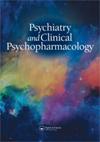青少年心理健康、依恋特征和不明原因胸痛:一项病例对照研究
IF 0.5
4区 医学
Q4 PHARMACOLOGY & PHARMACY
引用次数: 5
摘要
目的:心理因素可能是不明原因胸痛(UCP)的潜在原因。胸痛症状对儿童青少年的情绪状态和同伴关系有负向影响。然而,关注青少年UCP的病因和后果的研究数量仍然有限。摘要本研究旨在探讨一群青少年的心理问题、依恋特征与自我价值取向之间的关系。方法:将73名青少年UCP患者和71名健康青少年纳入研究。青少年完成父母与同伴依恋问卷(s-IPPA)和优势与困难问卷(SDQ),父母完成SDQ父母问卷。结果:与预期相反,父母总依恋水平与有UCP的青少年的UCP之间没有显著的相互作用。依恋问题与SDQ总分存在显著相关。二元logistic回归分析显示,较高的情绪、行为问题和较低的亲社会特征对青少年UCP有显著的预测作用。结论:结果表明情绪/行为问题和较低的亲社会行为得分与UCP有关。但是,对于UCP与依恋质量之间的关系,还需要进一步的研究。本文章由计算机程序翻译,如有差异,请以英文原文为准。
Adolescent mental health, attachment characteristics, and unexplained chest pain: a case–control study
ABSTRACT OBJECTIVES: Psychological factors may be the underlying causes in unexplained chest pain (UCP). Chest pain symptom may influence the emotional status and peer relationships of the children and adolescents negatively. However, the number of studies focussing on the aetiology and consequences of the adolescent UCP are still limited. The aim of this study is to investigate the relationships among psychological problems, attachment characteristics, and the UCP in a group of adolescents. METHODS: Seventy-three adolescents with UCP and seventy-one healthy adolescents were included in the study. The adolescents completed the short form of Inventory of Parent and Peer Attachment (s-IPPA), and Strengths and Difficulties Questionnaire (SDQ), while their parents completed the parental form of the SDQ. RESULTS: Contrary to expectations, there was no significant interaction between total parental attachment levels and UCP in the adolescents with UCP. There were significant correlations between the attachment problems and total difficulties score of SDQ. Binary logistic regression analysis revealed that higher emotional and conduct problems and lower pro-social characteristics predict the UCP in adolescents, significantly. CONCLUSIONS: The results suggested that emotional/behavioural problems and lower pro-social behaviour scores are associated with UCP. However, further studies are needed for better understanding about the relationships between the UCP and attachment quality.
求助全文
通过发布文献求助,成功后即可免费获取论文全文。
去求助
来源期刊

Psychiatry and Clinical Psychopharmacology
Medicine-Psychiatry and Mental Health
CiteScore
1.00
自引率
14.30%
发文量
0
期刊介绍:
Psychiatry and Clinical Psychopharmacology aims to reach a national and international audience and will accept submissions from authors worldwide. It gives high priority to original studies of interest to clinicians and scientists in applied and basic neurosciences and related disciplines. Psychiatry and Clinical Psychopharmacology publishes high quality research targeted to specialists, residents and scientists in psychiatry, psychology, neurology, pharmacology, molecular biology, genetics, physiology, neurochemistry, and related sciences.
 求助内容:
求助内容: 应助结果提醒方式:
应助结果提醒方式:


